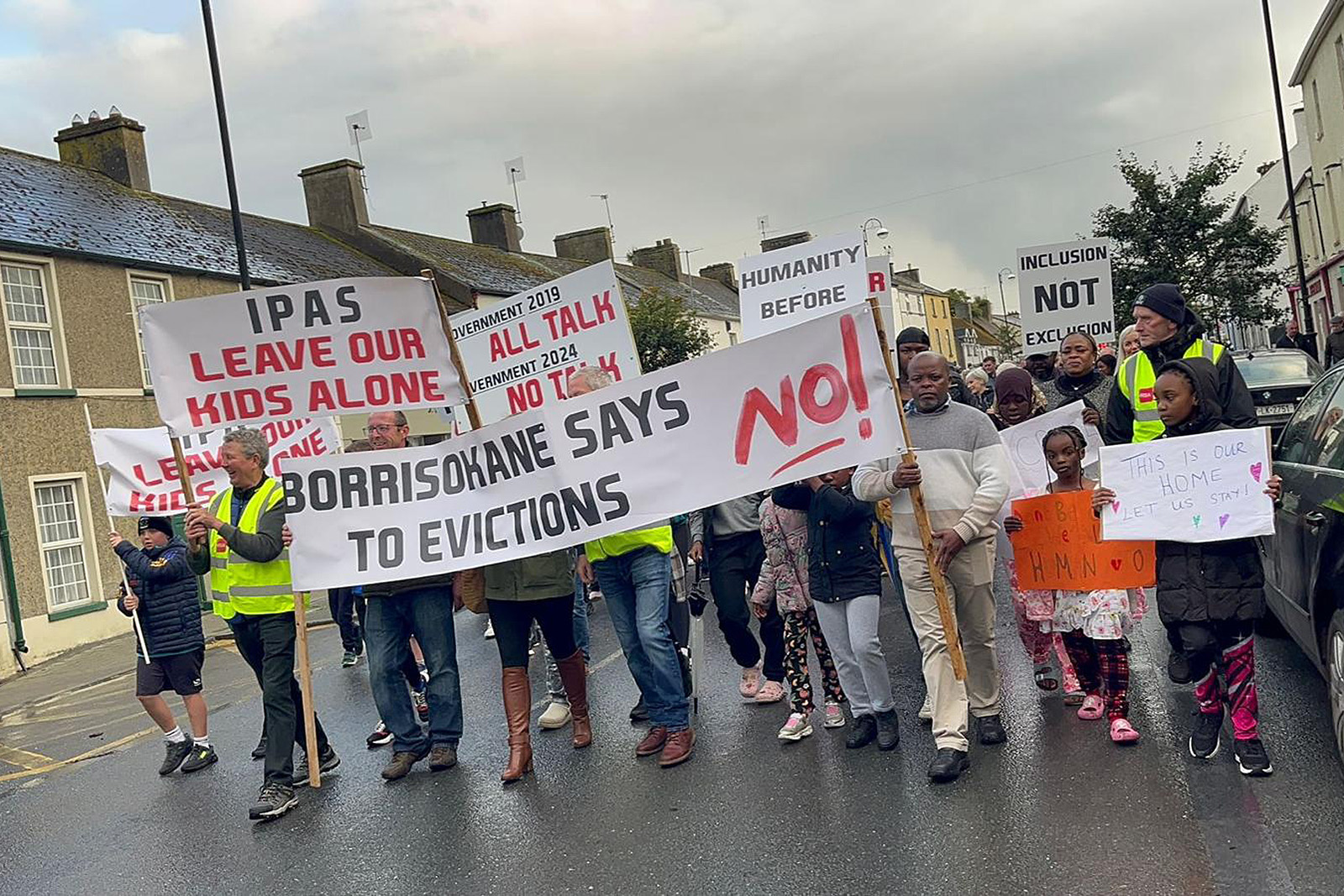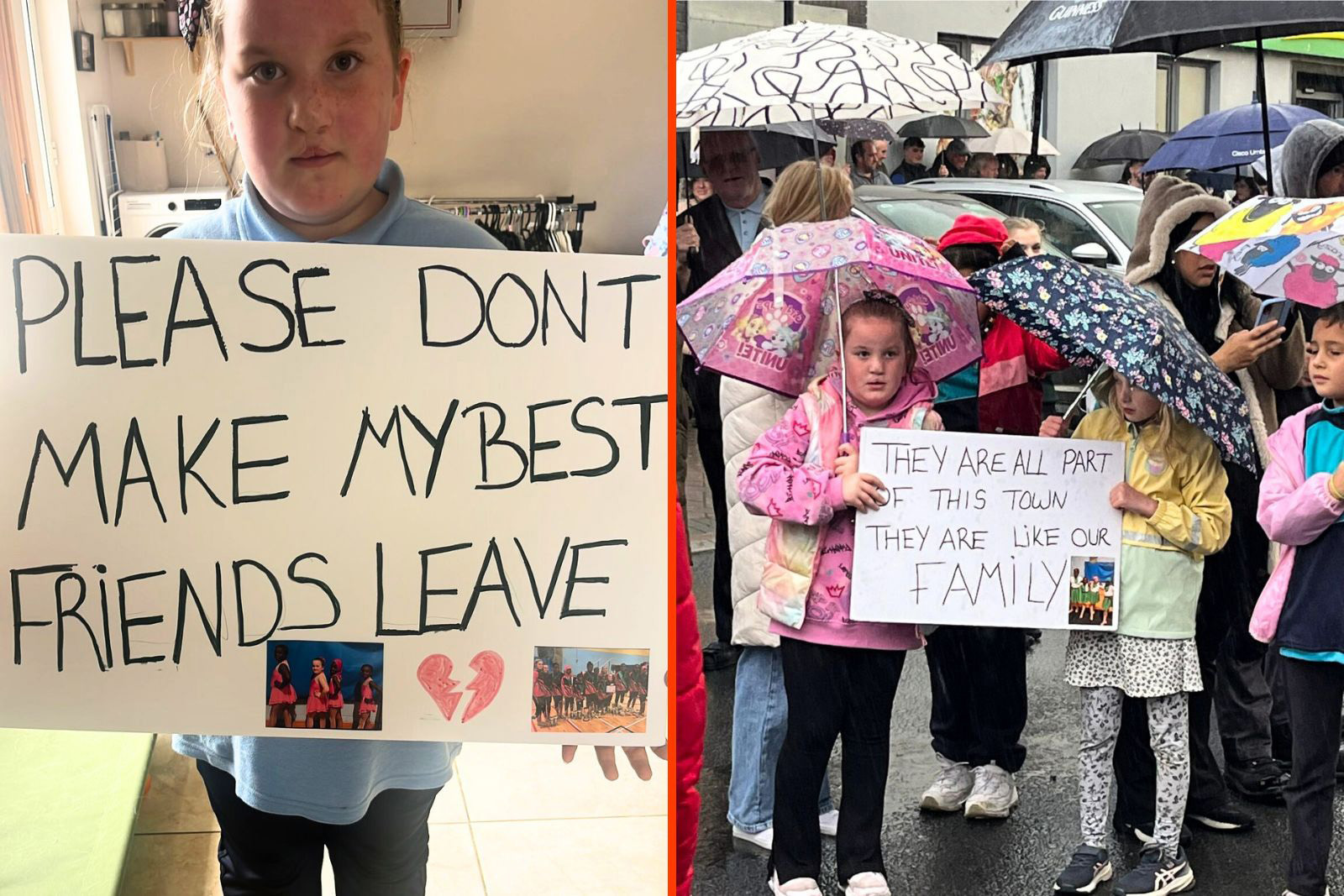The Irish town fighting to keep its asylum seekers
Residents of Borrisokane in Tipperary believe their model of integration is being needlessly dismantled by the government
–

In October 2019, residents of Borrisokane, a small town in County Tipperary in the Irish midlands, gathered for a public meeting to consider the government’s plan to house asylum seekers in a local apartment block.
Justin Barrett, who was then the leader of the far-right National Party, an organisation that has since made headlines for a sensational argument among its membership over the alleged theft of €400,000 worth of gold bars, stood and addressed the meeting. He told Borrisokane residents they were being lied to by local authorities, that immigration led to rising crime.
“I love my country and I want my country to be an Irish Ireland and I’m not ashamed of that,” Barrett said. While his declaration was met with some applause, local farmer Robert Armitage recalls this as the moment that the room swung decisively in favour of accepting the government’s proposal. A few days later, Barrett and his associates showed up again with a banner expressing hostility to the asylum seekers. “They got run out of the town,” Armitage said.
A second town meeting held shortly afterwards saw the creation of the Borrisokane Liaison Committee. The community nominated six women and six men who were given the job of liaising with the government agencies about the arrival of asylum seekers. “The intention was to welcome them and integrate them,” said Armitage, who lives next door to the Riverside Apartments where the new arrivals were to be housed and was among those nominated.
Together with local councillors, the Irish Department of Justice and the property’s owners, the committee agreed a plan that, if and when the asylum seekers were granted asylum, they could continue living in the Riverside Apartments and benefit from Ireland’s social housing support paid for by local authorities, the Housing Assistance Payment (HAP). Maria Donnelly, the committee’s secretary and accounts manager for a small company, says the people of Borrisokane were proud that their little town, which she describes as “one street”, had devised a new model for integration.
From November 2019, 96 International Protection Applicants moved into the apartments in Borrisokane, among them 16 families and 27 children, mainly from West Africa. Borrisokane held a welcome party in December and a booklet was produced listing everything in the town from bus routes to doctors. Donations of clothes and toys were also made by people in the town. Since their arrival, Armitage has been to two weddings of Riverside residents.
The number of asylum seekers arriving in Ireland has grown significantly in the past five years, just as the nation is struggling with an acute housing crisis and a rapidly increasing population. Between April 2023 and April 2024, 149,000 people arrived in Ireland, marking a 17-year high — 60,000 were either returning Irish, EU citizens or from the UK. In 2019, 7,000 people were in International Protections Accommodation Services nationwide. Today there are 32,000, with 2,000 men awaiting an offer of accommodation.
The past year has seen unprecedented anti-immigrant protests across Ireland. Buildings housing asylum seekers have been the target of arson attacks. Politicians across the political spectrum have responded to this shifting public mood with increasingly anti-immigrant rhetoric and policies. The conservative Irish Taoiseach Simon Harris recently, misleadingly, linked immigration to Ireland’s housing crisis. Ireland’s opposition party, Sinn Fein, has fallen in the polls while failing to walk a delicate balance as a left-wing nationalist party, losing support from working-class communities to the far right while damaging its image with young voters with policies that would limit places where asylum seekers could be housed.

When Galeema Davids arrived in Borrisokane from Cape Town with her then husband and four children under eight shortly before Christmas in 2019, she was worried. In Cape Town, there had been child abductions and she had feared for her children’s lives. But the family didn’t know anyone in Ireland and would have to build their lives from scratch.
Tipperary is a county with a strong tradition in hurling, Ireland’s ancient game. Davids’s children took to it, even if soccer was what they were used to. Integration comes easier in Tipperary if you have a hurl in your hand. “This town is all she knows,” Davids said of her now seven-year-old daughter. “They love their school, they’re involved in sports and drama. They play hurling and Gaelic football and soccer.”
In October 2020, however, responsibility for integration and reception of asylum seekers moved from the justice department to the Department of Children, Equality, Disability, Integration and Youth. In March this year, Davids received a letter from the Department of Integration informing her that the agreement reached by the justice department in 2019 was no longer viable and she would have to leave her apartment in Riverside.
Ten other Riverside families also received eviction letters. The Department of Integration informed them that as they had been granted leave to remain, they were no longer entitled to accommodation. According to official policy, once a person is granted asylum they have two years to find their own accommodation. The families were offered emergency housing 20 kilometres away in Birr in Count Offaly so the department could bring new people to Riverside.
The town was shocked by the decision, which entirely contradicted their landmark 2019 agreement. “I could wallpaper the house with the emails I’ve sent,” said Donnelly of her attempts to get answers from the government department now handling the issue. She has so far received no response.
Alan Kelly, the local TD (member of parliament) and former leader of the Irish Labour party, is among the locals campaigning for the families to stay. “[The asylum seekers] have fully integrated into Borrisokane and the agreement that they could stay on HAP, which was agreed with the liaison committee in 2019, should be honoured,” he told the Irish Examiner.
The Department of Integration told Hyphen that while it acknowledged the 2019 agreement’s “positive intentions”, it could not be considered a binding commitment. “We are now working with the families with status at the Riverside IPAS Centre, Tipperary County Council, and local community groups and representatives to find suitable alternative accommodation for these families in the local area,” a spokesperson said.
In September, Borrisokane marched in support of the right of the Riverside residents to remain. “I’ve never experienced support like that before, when people come out and stand up for us and fight for us as if we were family. It will always stay with me,” Davids said. “Just knowing that I had these people and seeing how much they were in our corner gave me the strength to gather myself.”
After an arduous search, familiar to anyone trying to rent in Ireland’s volatile housing market, Galeema has found a new place to live in Borrisokane. Others have already left for nearby areas and cities. A poster reading “inclusion not exclusion” has been stuck to the outside wall of the Riverside Apartments but inside, just four of the families served eviction letters remain.
The Department of Integration told Hyphen that these families were not going to be evicted. “[We] never allow people with [asylum] status to be left without accommodation, even though there is no formal legal entitlement to provide people with status with accommodation,” a spokesperson said.
The Liaison Committee has asked that any new arrivals should be sent to Birr rather than requiring Riverside’s current residents to leave and dismantling their model of integration. “These families have integrated,” Armitage said. “I feel for the children who were born here. They know nothing else. We think the solution we have here is a solution for the whole country.”
The Department of Integration agrees, in principle. “While we continue to work through the current issues in Borrisokane, we should not lose sight of the many positives, in an integration sense, that we have seen there,” a spokesperson said. “It is an example that we are working to foster, support and replicate in other communities around Ireland.”
Donnelly runs a baton twirlers group including several residents of the Riverside Apartments. It has won multiple national awards. She now collects those who have moved from Riverside to the countryside outside the town and brings them to practice. Their new routine begins with an asylum seeker and a local talking about how they have integrated: “Borrisokane is our home. We are from Borrisokane. The little town in Tipperary with the big heart.”
Topics
Get the Hyphen weekly
Subscribe to Hyphen’s weekly round-up for insightful reportage, commentary and the latest arts and lifestyle coverage, from across the UK and Europe
This form may not be visible due to adblockers, or JavaScript not being enabled.